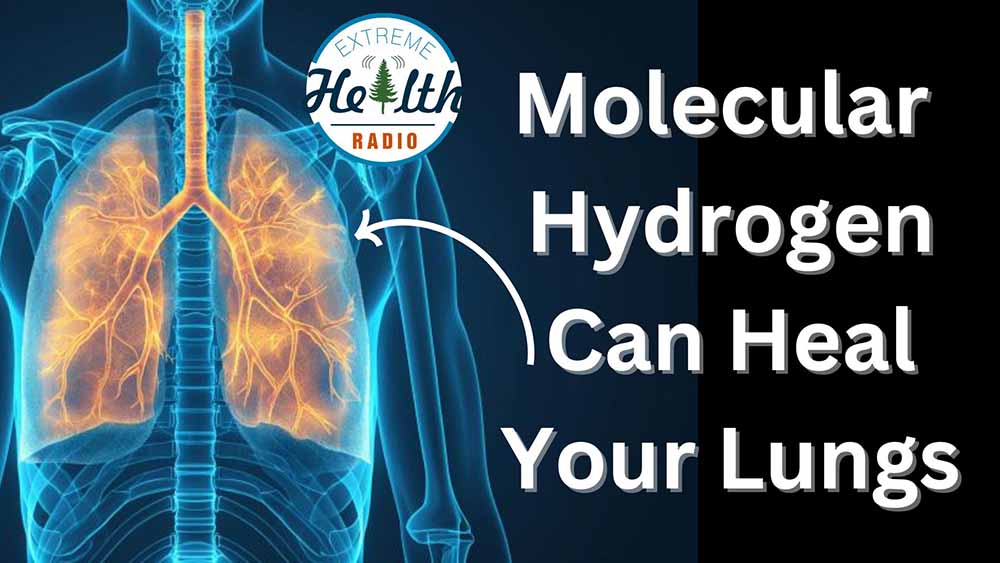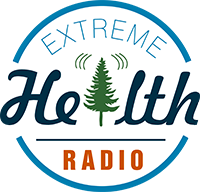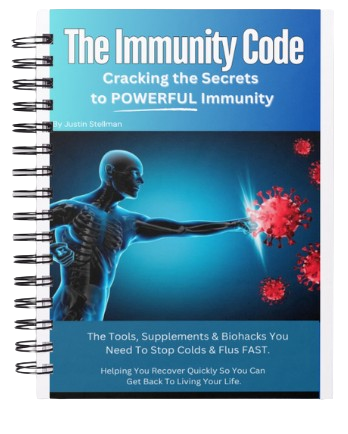
As I continue to research molecular hydrogen, the health benefits extend far beyond lung health.
But for this article I want to tackle all the benefits of molecular hydrogen specifically for the lungs. Maybe it’s because my mom God bless her is now 83 with COPD, emphysema, and previously dealt with lung cancer.
My dad has been diagnosed with pulmonary fibrosis and a friend of our just passed away last night from the same condition. I don’t know why but I have an affinity for helping people with their lung health.
I was first introduced to molecular hydrogen back in 2016. The health benefits were pretty profound but there wasn’t all the studies there are today.
Molecular hydrogen is probably the most exciting “new” biohack for health and longevity since air, food and water.
I mean it.
Listen to this show below to get an idea.
What Is Molecular Hydrogen?
I apologize for being a little bit nerdy but to understand molecular hydrogen we need to know what it is and what some terms mean.
Molecular hydrogen is known in my world (alternative health and natural healing) as H2. It is a diatomic molecule that has two hydrogen atoms that are bonded together (covalently…I’ll explain that in a moment) in a way that forms the most simple yet abundant molecule in the universe.
Crazy right?
Molecular hydrogen is the most abundant and ubiquitous molecule in the known universe.
Before we move on, let’s define what diatomic and covalent mean.
Diatomic simply refers to…
a molecule that consists of two atoms bonded together. These atoms can either be of the same element, such as hydrogen (H₂), oxygen (O₂), and nitrogen (N₂), or of different elements, like carbon monoxide (CO) and hydrogen chloride (HCl).
Diatomic molecules are classified into two types:
Homonuclear diatomic molecules – Contain two atoms of the same element (e.g., H₂, O₂).
Heteronuclear diatomic molecules – Contain two atoms of different elements (e.g., CO, NO).
and covalent refers to…
a type of chemical bond formed when two or more atoms share one or more pairs of electrons to achieve stability. This sharing of electrons allows the atoms to complete their outer electron shells, creating a stable molecular structure. Covalent bonds typically occur between nonmetal atoms and are characterized by their strength and directionality, meaning they form specific angles and shapes based on the arrangement of the shared electrons.
The interesting thing about molecular hydrogen is that it’s odorless, tasteless, and colorless. It’s a completely non toxic gas that exists in trace amounts in the earths atmosphere and beyond.
Molecular hydrogen has been used in fuel cells to create energy and even allow cars to run on hydrogen instead of gas. Instead of producing a toxic gas from the exhaust pipe, it produces water as a byproduct.
It’s not wonder why people that work on this technology have been “removed” from the planet and their work has been suppressed. You can’t make money from it.
What excites me the most (even though free energy is really exciting by itself!) is how molecular hydrogen can benefit the body by acting as an antioxidant aka an electron donor.
I’ll talk more below about the benefits of molecular hydrogen but I think it’s important to know what it actually is.
Hopefully I’ve explained that.
What Is Brown’s Gas?
Now that we know what molecular hydrogen is, let’s talk a bit about something called “Brown’s Gas” because this is what the AquaCure makes. It’s not just moledular hydrogen. It’s HHO or HydrOxy, is a unique gas mixture produced by the electrolysis of water without separating the resulting hydrogen and oxygen gases.
Here’s an excerpt for more detail on Brown’s Gas…
Unlike traditional electrolysis systems, Brown’s Gas electrolyzers lack a membrane between the electrodes, allowing the gases to combine in a 2:1 ratio of hydrogen to oxygen, along with water vapor and an additional component called Electrically Expanded Water (ExW).
So essentially the AquaCure device makes molecular hydrogen, brown’s gas, and electrically expanded water all at the same time.
To learn more about Brown’s Gas in general and the AquaCure in particular listen to the show below.
For every study you see about the benefits of molecular hydrogen, you’re also getting those two other substances with the molecular hydrogen.
It’s a triple whammy for healing.
My History With Lung Issues
As I mentioned before both my mom and dad are currently dealing with lung issues.
My dad was recently diagnosed with pulmonary fibrosis, although his symptoms don’t seem to match up to that lung disease. As a result we’re having him nebulize another powerful substance called methylene blue (and many other substances that are in my Lung Health Protocol) along with breathing carbon dioxide in a controlled way. We’re also making sure to have him breathe molecular hydrogen.
To learn more about methylene blue listen to our show below.
My mom on the other hand was a life long smoker (2 packs a day for 35 years…imagine how many cigarettes that is!). She quit in 1987 (Thank God).
As a result of all that smoking (and other factors too like spraying the flowers in our backyard with Roundup – see podcast below) she was diagnosed with non Hodgkin’s lymphoma in 1995. Since then she’s had multiple lung cancers and had 2 of her 5 lung lobes removed.
As a result she’s got COPD, emphysema and other respiratory issues.
All that to say, I have an affinity for helping people with their lung health.
So let’s talk about the benefits of molecular hydrogen for lung health specifically.
Benefits of Molecular Hydrogen For Lungs
1. Asthma
Molecular hydrogen alleviates asthma through inhibiting IL-33/ILC2 axis
I came across an interesting study titled “Molecular hydrogen alleviates asthma through inhibiting IL-33/ILC2 axis” by Chong Bai and colleagues. It was conducted using an OVA-sensitized asthma mouse model and a house dust mite-treated cellular model to explore how molecular hydrogen affects asthma. The research took place relatively recently, around 2021. The results showed that molecular hydrogen significantly reduced levels of inflammatory markers like IL-33 and other cytokines, which were elevated in asthmatic mice. It also restored protective proteins like E-cadherin and ZO-1, and decreased cell apoptosis in airway tissues. The conclusion? Molecular hydrogen appears to effectively suppress asthma-related inflammation and could potentially be developed as a treatment for asthma and other inflammatory conditions. – Source
2. COPD
Hydrogen/oxygen therapy for the treatment of an acute exacerbation of chronic obstructive pulmonary disease
This 2021 study, “Hydrogen/oxygen therapy for the treatment of an acute exacerbation of chronic obstructive pulmonary disease,” was a multicenter, randomized, double-blind, controlled trial conducted in China. It investigated whether a hydrogen/oxygen gas mixture was more effective than standard oxygen therapy for treating acute COPD flare-ups. The results showed that patients receiving hydrogen/oxygen therapy had significantly greater improvement in symptom scores (BCSS) compared to those on oxygen alone, with better reductions in cough severity. Both therapies were well-tolerated, and no deaths or equipment issues were reported. The study concluded that hydrogen/oxygen therapy is a safe and superior option for managing COPD exacerbations. – Source
3. Interstitial Lung Disease
Efficacy and Safety of Hydrogen Therapy in Patients with Early-Stage Interstitial Lung Disease
The 2023 study, “Efficacy and Safety of Hydrogen Therapy in Patients with Early-Stage Interstitial Lung Disease,” was a single-center, randomized, controlled trial conducted in China. It compared hydrogen therapy to N-Acetylcysteine (NAC) in 87 patients over 48 weeks. The results showed that the hydrogen group had greater improvement in lung imaging (HRCT) and lung function markers like the composite physiologic index (CPI) and DLCO-sb, while other pulmonary function parameters were similar between groups. Both treatments were well-tolerated, with no significant difference in adverse events. The study concluded that hydrogen therapy is more effective and equally safe as NAC for early-stage ILD. – Source
4. COVID
Molecular Hydrogen Positively Affects Physical and Respiratory Function in Acute Post-COVID-19 Patients:
The 2022 study, “Molecular Hydrogen Positively Affects Physical and Respiratory Function in Acute Post-COVID-19 Patients,” was a randomized, single-blind, placebo-controlled trial conducted in the Czech Republic. It tested the effects of 14 days of hydrogen inhalation therapy (twice daily for 60 minutes) on 50 post-COVID-19 patients. Results showed significant improvements in walking distance, forced vital capacity (FVC), and forced expiratory volume (FEV1) compared to the placebo group. The study concluded that hydrogen therapy is a safe and effective method for improving physical and respiratory recovery in post-COVID patients. – Source
5. Sepsis
Hydrogen alleviates cell damage and acute lung injury in sepsis
The 2021 study, “Hydrogen alleviates cell damage and acute lung injury in sepsis via PINK1/Parkin-mediated mitophagy,” was conducted in China using cell culture and mouse models to investigate hydrogen’s effects on sepsis-induced lung injury. The researchers found that hydrogen reduced inflammation and cell damage by enhancing mitophagy—a process that clears damaged mitochondria—through the PINK1/Parkin pathway. When PINK1 was knocked down, hydrogen’s protective effects were lost, confirming its role. The study concluded that hydrogen therapy may protect against sepsis-induced lung injury by promoting mitophagy and reducing oxidative stress and inflammation. – Source
6. Lung Cancer
Two weeks of hydrogen inhalation can significantly reverse adaptive and innate immune system senescence patients with advanced non-small cell lung cancer
The 2020 study, “Two weeks of hydrogen inhalation can significantly reverse adaptive and innate immune system senescence in patients with advanced non-small cell lung cancer,” was a self-controlled clinical trial conducted in China. It involved 20 patients who inhaled a hydrogen/oxygen gas mixture for 4 hours daily over 2 weeks without other treatments. The results showed significant improvements in immune function, including reductions in exhausted and senescent T cells and increases in functional T cells and natural killer cells. The study concluded that hydrogen therapy may help reverse immune aging and support immune recovery in advanced lung cancer patients. – Source
Hydrogen therapy can be used to control tumor progression and alleviate the adverse events of medications in patients with advanced non-small cell lung cancer
The 2020 study, “Hydrogen therapy can be used to control tumor progression and alleviate the adverse events of medications in patients with advanced non-small cell lung cancer,” was a clinical trial conducted in China. It involved 58 patients who inhaled hydrogen gas for 4–5 hours daily over 5 months, either alone or combined with chemotherapy, targeted therapy, or immunotherapy. The results showed that patients receiving hydrogen therapy experienced reduced symptoms, improved progression-free survival, and fewer drug-related side effects compared to controls. The study concluded that hydrogen therapy may help slow tumor progression and mitigate side effects from cancer treatments. – Source
Hydrogen gas represses the progression of lung cancer via downregulating CD47
The 2020 study, “Hydrogen gas represses the progression of lung cancer via downregulating CD47,” was a cell culture and animal model study conducted in China. It investigated how hydrogen gas affects lung cancer cells by targeting CD47, a protein linked to tumor growth and immune evasion. The results showed that hydrogen treatment reduced CD47 expression, suppressed cell growth, invasion, and migration, and promoted apoptosis in lung cancer cells, while enhancing macrophage-mediated phagocytosis. The study concluded that hydrogen gas may inhibit lung cancer progression by downregulating CD47, offering a potential therapeutic strategy for lung cancer treatment. – Source
Conclusion
As you can see from these studies (there are over 1,000 studies on the benefits of molecular hydrogen for many health issues) molecular hydrogen is a supreme antioxidant that is so small it can not only donate electrons and help repair your redox potential.
In fact it’s so small that it can repair DNA. The work of Dr. Mirko Beljanski showed that the cancer process has a lot to do with broken DNA. The fact that molecular hydrogen can repair DNA means it makes sense to me that it would help with cancer.
Perhaps in subsequent articles we can talk more about all the benefits of molecular hydrogen for other health conditions, not just for your lungs.
Questions
- Have you ever heard of molecular hydrogen before?
- Do you currently ingest molecular hydrogen?
- If so, what health benefits have you notices?
Comment below!


